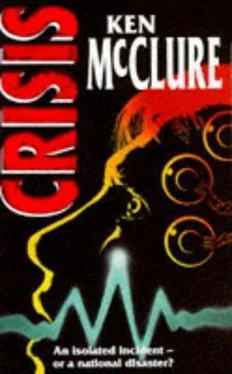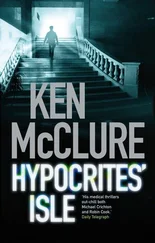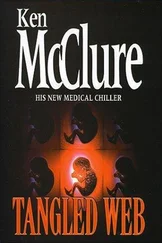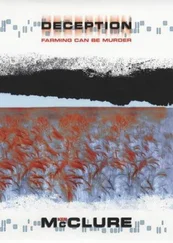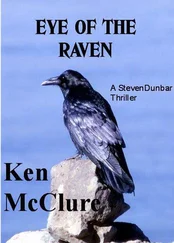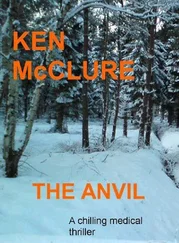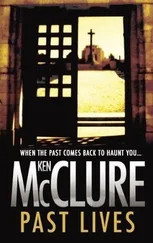Ken McClure - Crisis
Здесь есть возможность читать онлайн «Ken McClure - Crisis» весь текст электронной книги совершенно бесплатно (целиком полную версию без сокращений). В некоторых случаях можно слушать аудио, скачать через торрент в формате fb2 и присутствует краткое содержание. Жанр: Триллер, на английском языке. Описание произведения, (предисловие) а так же отзывы посетителей доступны на портале библиотеки ЛибКат.
- Название:Crisis
- Автор:
- Жанр:
- Год:неизвестен
- ISBN:нет данных
- Рейтинг книги:3 / 5. Голосов: 1
-
Избранное:Добавить в избранное
- Отзывы:
-
Ваша оценка:
- 60
- 1
- 2
- 3
- 4
- 5
Crisis: краткое содержание, описание и аннотация
Предлагаем к чтению аннотацию, описание, краткое содержание или предисловие (зависит от того, что написал сам автор книги «Crisis»). Если вы не нашли необходимую информацию о книге — напишите в комментариях, мы постараемся отыскать её.
Crisis — читать онлайн бесплатно полную книгу (весь текст) целиком
Ниже представлен текст книги, разбитый по страницам. Система сохранения места последней прочитанной страницы, позволяет с удобством читать онлайн бесплатно книгу «Crisis», без необходимости каждый раз заново искать на чём Вы остановились. Поставьте закладку, и сможете в любой момент перейти на страницу, на которой закончили чтение.
Интервал:
Закладка:
The telephone rang and startled him. It was the owner announcing that his steak was ready.
SEVEN
Bannerman telephoned the Medical Research Council in the morning. It seemed to take an age before he was put through to Hugh Milne.
‘I tried calling you in Edinburgh; I was told you had gone north,’ said Milne.
‘Something awful has happened,’ said Bannerman. ‘Lawrence Gill has been murdered.’
‘Murdered?’ exclaimed Milne.
‘I don’t know who did it or why, but I do know that it had something to do with this brain disease business.’
‘But this is incredible. Why would anyone want to murder a pathologist who was simply trying to establish a cause of death?’
Bannerman took a deep breath and said, 1 know it sounds stupid, but I’m convinced that someone or some …’ Bannerman searched for a word, ‘faction, does not want the true cause of death discovered.’ He told Milne about the brains having been removed from the cadavers in Edinburgh.
‘Where exactly are you?’ asked Milne.
There wasn’t much point in staying in Edinburgh with no pathological material to work on, so I came up to Achnagelloch. I found out from Gill’s wife about the island he had run off to, so I tried to find him to ask about the missing brains. Instead I found him at the bottom of a cliff.’
‘I suppose there’s no chance it was an accident?’
‘None at all. Gill was hiding on the island because he knew someone was after him. He tried sending a parcel to you which I think contained the missing brains.’
‘But why send it to us when we had already seen the slides he had prepared?’
‘I wish I knew.’
There was a pause in the conversation. Bannerman guessed that Milne was having difficulty coming to terms with what he had heard. He suspected that the introduction of possible criminal involvement in what was thought to be a purely medical mystery was having the same unsettling effect on Milne as it was on himself. Both of them were getting out of their depth.
Milne broke the silence, ‘Perhaps you should return to London immediately,’ he said. ‘There may be danger in pursuing the investigation.’
‘I’ve thought about that,’ said Bannerman, ‘but I’m here now, so I may as well ask around a bit. It would be a help though if Gill’s death were played down for the moment. I don’t want the newspapers making connections between Gill’s murder and the problems up here. I thought your colleague, Mr Allison, from the Prime Minister’s office might help in that direction.’
‘I’ll alert him. I’m sure he has no wish to see this develop into a media circus.’
‘I’m sure he hasn’t,’ agreed Bannerman with just the merest hint of sarcasm, thinking about the cover-up of the radiation leak at Invermaddoch.
As a first step, Bannerman set out to find the vet’s surgery in Achnagelloch. He hadn’t bothered to ask at the hotel for directions because he thought the place small enough for him to find it on his own and he wanted to take a look at the town. He liked small towns; he liked their manageable proportions, the fact that you could see how everything worked and fitted together, unlike big cities which were anonymous places, their workings hidden inside bland concrete boxes.
After twenty minutes of searching he admitted defeat and asked directions from a woman who was coming out of a shop, carrying bread and milk. The bell attached to the shop door jangled loudly as she closed it, obliging him to begin his question over again. ‘I’m looking for Mr Finlay, the vet,’ he said. ‘Can you tell me where his surgery is please?’
The woman looked at Bannerman as if he had arrived from a strange planet. She stared at him so long without expression that he felt himself become embarrassed. The smile died on his lips.
‘You’re not from round here,’ said the woman.
‘No I’m not,’ agreed Bannerman, declining to add details.
‘Finlay lives in the old manse.’
‘The old manse.’
The woman nodded as if this were enough.
‘How do I find the old manse?’ asked Bannerman.
‘Just outside the town,’ said the woman.
This way?’ asked Bannerman, pointing with his finger to the east.
The woman nodded and looked at him as if there were no other way out of town.
‘Thank you. You’ve been most helpful.’
The old manse stood about a hundred metres back from the main road and was hidden from view by a stone wall which was topped by green lichen. Several yew trees formed a secondary screen and cast a shadow over the house. Bannerman walked up the drive to the dark building which looked as if it had been built to the design of a primary-school class drawing. It was a simple stone box, two storeys high with regularly placed windows, all the same size. The door was placed exactly in the middle and there was a single chimney in the centre of the roof. Outside, on a semi-circular apron of gravel, stood a Land Rover and a dark green Jaguar with a number plate on it that told Bannerman it was as new as it looked. He paused to admire the gleaming paintwork and the fat sports tyres. He rang the doorbell.
The presence of the Land Rover had cheered Bannerman. It suggested that he had caught Finlay before he set out on his rounds. This was confirmed by a woman who answered the door, eating a piece of toast. She pressed her hand to her chest and gave an exaggerated swallow to empty her mouth before saying, ‘Excuse me, I’m just finishing my breakfast.’
Bannerman asked if he might speak to Finlay. He was invited in and shown into a front room, where he stood looking at the pictures on the wall until he heard someone come into the room behind him.
‘You’re not from round here,’ said the short, balding man that Bannerman found before him. He had a fair, ruddy complexion and was running to fat despite the fact that Bannerman reckoned he could not have been more than thirty. His lips had a moist quality about them which Bannerman thought unpleasant in a man. He wore baggy corduroy trousers and a navy blue Guernsey sweater.
‘No, I’m not,’ agreed Bannerman, thinking that the next person to make that observation might well push him over the edge. He announced who he was and added, ‘‘I’m looking into the deaths of the three farm workers at Inverladdie.’
‘Most unfortunate,’ said Finlay. ‘Meningitis, I believe.’
Bannerman nodded. ‘A particularly virulent form,’ he said, ‘hence our interest.’
‘How can I help?’ asked Finlay.
‘I understand that there was an outbreak of Scrapie on the farm where the men worked?’
‘Yes, that’s right,’ agreed Finlay, quietly. His expression betrayed the fact that he was trying to work out the connection.
‘You made the diagnosis in the animals?’
‘Yes … I’m sorry, I don’t see what this has to do with …’
Bannerman made a dismissive gesture with his hands and said, ‘At this stage I’m just gathering together all the facts I can about the dead men’s lives.’ He added what he hoped was a reassuring smile.
‘Again?’ asked Finlay with a suggestion of irritation.
‘I’m sorry?’’
‘A pathologist named Gill came to see me and asked the same sort of questions. I just don’t see what the Scrapie outbreak has to do with the deaths.’
Bannerman thought it strange that a vet could not follow such a line of questioning with ease. He had been prepared to ask for Finlay’s discretion in not mentioning the possibility of a link between Scrapie and the deaths, but now it did not seem necessary. ‘Did you send brain samples from the sheep to the vet lab?’ he asked.
‘No I didn’t,’ said Finlay.
‘Why not?’ asked Banner-man, as pleasantly as he could ask that sort of question.
Читать дальшеИнтервал:
Закладка:
Похожие книги на «Crisis»
Представляем Вашему вниманию похожие книги на «Crisis» списком для выбора. Мы отобрали схожую по названию и смыслу литературу в надежде предоставить читателям больше вариантов отыскать новые, интересные, ещё непрочитанные произведения.
Обсуждение, отзывы о книге «Crisis» и просто собственные мнения читателей. Оставьте ваши комментарии, напишите, что Вы думаете о произведении, его смысле или главных героях. Укажите что конкретно понравилось, а что нет, и почему Вы так считаете.
